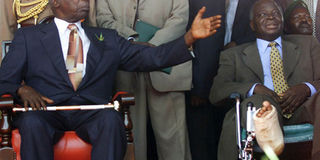Kanu’s four-decade grip on power ends

Outgoing president Daniel arap Moi, left, gestures as he sits alongside Kenya's newly elected president Mwai Kibaki during a swearing-in ceremony in Nairobi, Monday Dec. 30, 2002. Veteran politician Kibaki and his opposition alliance were swept into office three days earlier in general elections won for the first time by the political opposition. Photo/FILE
What you need to know:
- After the NARC victory, Kanu, which had been in power for 40 years, found itself on the receiving end.
- Even forming an opposition in Parliament was not conceivable as Uhuru found himself groping in the dark.
- There was yet more trauma after the swearing in of President Kibaki on Tuesday, December 30, 2002. Moi was heckled at Uhuru Park during the ceremony and his motorcade was pelted with mud as he left the venue for State House.
Kenya held a General Election in which the ruling party, Kanu, lost power after 40 years.
Outgoing President Daniel arap Moi, who had ruled for 24 of those years, was barred from contesting by the Constitution but backed his protégé, Uhuru Kenyatta, against the opposition’s Mwai Kibaki. For the first time, the opposition in 2002 went into the election united.
Moi’s decision to anoint Uhuru, the son of his predecessor, Jomo Kenyatta, as his successor, caused irreparable damage to Kanu, with a massive exodus that helped unite the opposition.
On December 27, Kenyans voted overwhelmingly for Kibaki, the National Rainbow Coalition (NARC) candidate.
Kibaki, who was in a wheelchair following a road accident on his way back to Nairobi from a campaign rally in Machakos, won with landslide.
After the NARC victory, Kanu, which had been in power for 40 years, found itself on the receiving end.
GROPING IN THE DARK
Even forming an opposition in Parliament was not conceivable as Uhuru found himself groping in the dark.
There was yet more trauma after the swearing in of President Kibaki on Tuesday, December 30, 2002. Moi was heckled at Uhuru Park during the ceremony and his motorcade was pelted with mud as he left the venue for State House.
At the seat of power, his senior aides wept as a helicopter airlifted him to retirement at his Kabarak home. Dr Sally Kosgei, the then head of the public service, was captured on camera crying.
Moi’s exit from power marked the end of an era for one of the Africa’s big men who had dominated Kenya for a quarter of a century.
NARC’s actions became even more hurtful to Kanu, which had always had the upper hand.
First, NARC repossesed the Kenyatta International Conference Centre (KICC), a Nairobi landmark that was built using public funds but which Kanu had taken possession of KICC had been a permanent audit query in the books of the Controller and Auditor General, with questioned how a government building became the property of a political party.
It was Raphael Tuju, whom Kibaki had appointed minister for Tourism, who seized the building, invoking the powers of an executive order.
Kanu contested the matter in court but the case fizzled out since the party did not pursue it beyond mention.
Other property that Kanu had acquired around the country was repossessed by the NARC government one by one.
UNCOVERING KANU'S ILLS
The next phase was to the uncovering of Kanu’s ills during its four decades in power.
The torture chambers at Nyayo House, Nairobi, where Raila Odinga was among those held in the 1980s, was laid bare. It was remarkable seeing victims of the Kanu misrule seated on the floor of the site of their torture.
The last phase was a Judiciary purge. Chief Justice Bernard Chunga opted to retire before a commission of inquiry chaired by then Speaker of the National Assembly, Francis Kaparo, even began its sittings.
The biggest purge of the Judiciary came with the Justice Aaron Ringera’s commission.
Judges and magistrates were sent home while others chose to quit rather than challenge their sacking in court. Some who challenged their dismissal, like Justice Msagha Mbogholi, won and were reinstated.
The next destination was the civil service, which was dominated by Kanu supporters.
A good number was retired, including, Dr Kosgei. It later became a campaign issue of the failed constitutional referendum of 2005 and the election of 2007, plus the violence that followed that year’s election.
Then came cases against Kanu and in particular, President Moi’s excesses, which continue to today. Torture victims have received hefty court awards and land illegally acquired during Kanu’s reign has been reclaimed.



